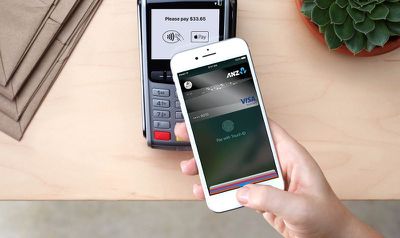Apple Hits Out At Australian Banks For 'Trojan Horse' Argument Over Mobile Payment System Access
Apple has fired the latest salvo in its continuing battle with Australia's banks over the future of mobile payments, accusing the industry of continually trying to obstruct the expansion of Apple Pay into the country (via Bloomberg).
In a submission to the Australian Competition and Consumer Commission (ACCC) published on Monday, Apple said the banks' attempts to delay or even block the expansion of Apple Pay was damaging to consumers and smaller card issuers who could use the system "as a means of securing a digital presence in competition with the big banks".

In July of last year, Commonwealth Bank, Westpac, National Australia Bank (NAB), and Bendigo and Adelaide Bank sought to enter into group talks with Apple to negotiate access to the NFC hardware in the iPhone so they could offer their own mobile payments services using the iPhone's NFC chip. Apple argued that giving the banks such access would "undermine the security and simplicity" of its system. The ACCC later drafted a ruling that refused to grant the banks permission to negotiate collectively.
In its latest submission to the ACCC, Apple argued that the banks' argument over access to the iPhone's NFC chip was a "Trojan horse" and that their wish to have the ability to charge consumers for using Apple Pay was "logically inconsistent", given that competition from other issuers like ANZ who do not charge for using Apple Pay would prevent them from doing so.
"Perhaps the explanation might be that this is perceived by the applicant banks as a way of introducing and then proliferating a new revenue stream in the digital payments age. It may well be that the applicant banks have taken the view that customers may be more willing to pay fees to use Apple Pay because of the ease and security of using Apple Pay and, on that basis, see an opportunity to introduce and condition the market to transaction fees for the use of Apple Pay, with the longer term view to setting a precedent for charging for mobile payments on other digital wallets, in the future, including the banks’ own proprietary wallets."
The banks responded later on Monday with a statement claiming Apple's interpretation was wrong:
The application has never been about preventing Apple Pay from coming to Australia or reducing competition between wallets. It has always been about providing real choice and real competition for consumers and facilitating innovation and investment in the digital wallet functionality available to Australians. Apple's statement that the application is fundamentally about an objection to the fees that Apple wish to be given rather than NFC access, is incorrect and unsupported.
According to the banks, the applicants will soon provide a response to the ACCC's draft decision that would further demonstrate the net public benefits of the application.
Popular Stories
Apple's next-generation iPhone 17 Pro and iPhone 17 Pro Max are less than three months away, and there are plenty of rumors about the devices.
Apple is expected to launch the iPhone 17, iPhone 17 Air, iPhone 17 Pro, and iPhone 17 Pro Max in September this year.
Below, we recap key changes rumored for the iPhone 17 Pro models:Aluminum frame: iPhone 17 Pro models are rumored to have an...
The long wait for an Apple Watch Ultra 3 appears to be nearly over, and it is rumored to feature both satellite connectivity and 5G support.
Apple Watch Ultra's existing Night Mode
In his latest Power On newsletter, Bloomberg's Mark Gurman said that the Apple Watch Ultra 3 is on track to launch this year with "significant" new features, including satellite connectivity, which would let you...
The upcoming iPhone 17 Pro and iPhone 17 Pro Max are rumored to have a slightly different MagSafe magnet layout compared to existing iPhone models, and a leaked photo has offered a closer look at the supposed new design.
The leaker Majin Bu today shared a photo of alleged MagSafe magnet arrays for third-party iPhone 17 Pro cases. On existing iPhone models with MagSafe, the magnets form a...
iOS 26 and iPadOS 26 add a smaller yet useful Wi-Fi feature to iPhones and iPads.
As spotted by Creative Strategies analyst Max Weinbach, sign-in details for captive Wi-Fi networks are now synced across iPhones and iPads running iOS 26 and iPadOS 26. For example, while Weinbach was staying at a Hilton hotel, his iPhone prompted him to fill in Wi-Fi details from his iPad that was already...
The iPhone 17 Pro Max will feature the biggest ever battery in an iPhone, according to the Weibo leaker known as "Instant Digital."
In a new post, the leaker listed the battery capacities of the iPhone 11 Pro Max through to the iPhone 16 Pro Max, and added that the iPhone 17 Pro Max will feature a battery capacity of 5,000mAh:
iPhone 11 Pro Max: 3,969mAh
iPhone 12 Pro Max: 3,687mAh...
Apple today seeded the second betas of upcoming iOS 18.6 and iPadOS 18.6 updates to public beta testers, with the betas coming just a day after Apple provided the betas to developers. Apple has also released a second beta of macOS Sequoia 15.6.
Testers who have signed up for beta updates through Apple's beta site can download iOS 18.6 and iPadOS 18.6 from the Settings app on a compatible...
Apple is developing a MacBook with the A18 Pro chip, according to findings in backend code uncovered by MacRumors.
Subscribe to the MacRumors YouTube channel for more videos.
Earlier today, Apple analyst Ming-Chi Kuo reported that Apple is planning to launch a low-cost MacBook powered by an iPhone chip. The machine is expected to feature a 13-inch display, the A18 Pro chip, and color options...




















